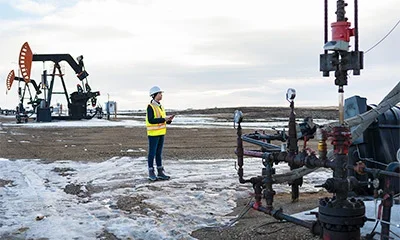- Resources
- Investors helped build Europe’s methane rules. Now they must defend them.
Resources
Investors helped build Europe’s methane rules. Now they must defend them.
Published: July 17, 2025 by Ismael Hernandez Rivera and Suzanne Brady, EDF
In 2024, the European Union took a bold step toward climate action by finalizing its methane regulation, a first-of-its-kind measure to curb one of the most potent greenhouse gases. The law aims not only to cut emissions, but to restore accountability to the energy sector and align Europe’s fossil fuel supply chain with its climate responsibility. That vision wouldn’t have been possible without pressure from the global investor community.
But the job isn’t finished.
Part of the fossil fuel industry is now pushing to delay, dilute or distort the implementation of the EU Methane Emissions Regulation. For this historic law to deliver the methane reductions it was designed to achieve, investors must remain engaged. Their voices — trusted in both boardrooms and ministries — are essential to resisting attempts to weaken the regulation and preserving its ambition.
A powerful, science-based solution
The regulation is a science-based transparency tool that, once fully implemented, will apply to all fossil energy suppliers to the EU — whether operating inside or outside its borders. It sets maximum methane intensity levels for fossil fuels entering the EU market and ensures fair competition by holding all suppliers to the same standards. This includes rigorous monitoring, reporting, and verification (MRV) of emissions, drawing on the Oil and Gas Methane Partnership 2.0 (OGMP 2.0) framework–already adopted by more than 150 companies worldwide–while allowing flexibility for companies to find alternative, equivalent solutions.
Data transparency and availability are at the heart of the regulation. Accurate, comparable, and independently verified methane data is not just a win for policymakers — it’s a win for markets. For investors, effective methane management reduces reputational and transition risk, enhances confidence in corporate climate disclosures, and helps align portfolios with global climate objectives. The legislation also brings regulatory certainty and a consistent framework for evaluating energy investments across borders.
Still, even after its adoption, the regulation faces resistance. Some industry voices are calling for “simplification”, delay, or questioning the feasibility of implementation, often without offering credible alternative timelines that would ensure the regulation’s key provisions are met. Others claim the rules could threaten energy security and affordability. These arguments present a skewed picture of EU energy security and overlook the need to reduce fossil fuel dependencies.
As a groundbreaking regulation setting new expectations across the methane value chain, it is natural to face challenges during implementation. Still, the regulation was designed with this in mind: it is both progressive and flexible, allowing industry to find credible, fit-for-purpose solutions. Without continued investor pressure, however, pushback risks weakening the regulation’s core: enforceable, science-based limits on methane pollution.
A call for continued investor leadership
The financial sector has already played a pivotal role in advancing methane accountability around the world — from urging U.S. regulators to strengthen oil and gas rules, to supporting global methane metrics in corporate disclosures. That same leadership is urgently needed now to ensure the EU’s methane rule is implemented with the strength and speed the planet demands.
What can investors do?
First, engage directly with policymakers. EU Member States need to hear that the financial community supports the timely and ambitious implementation of the rule, and reopening or delaying it would harm both market integrity and the climate.
Second, signal support to the energy industry. Investors can encourage companies to engage constructively with regulators, rather than lobbying against the regulation. The regulation’s flexibility and phased timeline were designed to help regulators address legitimate industry concerns.
Finally, go public. Private conversations are important. However, public statements, joint letters, and strategic outreach can reinforce market support and help build and solidify political will.
The next few months will determine whether the EU Methane Regulation lives up to its promise or withers before it’s fully implemented. With a little more resolve from the financial community, Europe can prove that smart climate policy, investor confidence, and energy security aren’t competing priorities — they’re mutually reinforcing goals.
EDF+Biz staff stands ready to help the investor community as it engages with policymakers and the energy industry. If you have any questions, please don’t hesitate to reach out to Ismael Hernandez Rivera.




